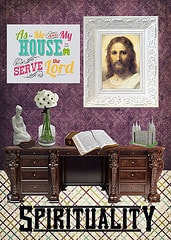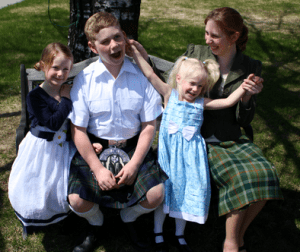 I had these guest posts loosely scheduled on my calendar several weeks ago. It’s amazing to me how things work out sometimes. Last week’s Establish a House post generated a very good question from a reader about what to do when spouses aren’t quite in agreement or on board with certain teaching aspects. There were some great reader responses. Those lead right into this week’s post graciously written by Liz (NotMolly) who shares how she and her husband, who are not of the same faith, work together to teach their children.
I had these guest posts loosely scheduled on my calendar several weeks ago. It’s amazing to me how things work out sometimes. Last week’s Establish a House post generated a very good question from a reader about what to do when spouses aren’t quite in agreement or on board with certain teaching aspects. There were some great reader responses. Those lead right into this week’s post graciously written by Liz (NotMolly) who shares how she and her husband, who are not of the same faith, work together to teach their children.
Liz (NotMolly) is wife to a Tall, Dark, and Slightly Neanderthal Fellow she met quite by accident, and mother to four beloved Minions, ages sixteen to very-nearly-five. She hails from a long line of Scottish Hermits, and currently schools the Minions and works from a happy home in a tiny cottage on the western reaches of the Rocky Mountains. She and her husband own a miniscule publishing company for obscure niche books and sewing patterns. She currently serves as Perma-Sub for chorister duties and Sunday School and Relief Society teaching, and is the youngest Church Lady in her ward by a good three decades. She finds tremendous joy studying the lives and society of the early LDS, reads omnivorously, and loves to sing. She is quite disadvantaged as a pianist, and positively dreadful on the cello. Being a good Hermit, she avoids cameras; she and her son still have the same viewing angles, though now he is rather too large to lift.
I was raised, as my grandmother’s generation called it, “churched.” As in, we went there. Every week. Sometimes a few different days a week. Definitely on Sundays (our own services, and others as well, if we were invited. My parents were (are) very keen on appreciating the faith of others). And we talked about God a lot, and learned scripture stories, and even drizzled our quilt-cocooned bodies out of bed in the morning, ending up with one eyeball draped over the landing of our log-house loft to peer blearily down at our mother as she read scripture aloud before breakfast.
My Beloved’s parents were a mixed marriage: she, genetically Catholic; he, lapsed Methodist. They compromised in the mine-strewn marital field of faith issues by Never Talking About Anything To Do With God Or Church. Ever. And it worked pretty well for them. They raised my Beloved and his siblings with good morals, excellent ethics, and no church. So, he’s what my grandmother’s generation would call “un-churched.” Once he hit his teens and became a bagpipe player, he went to a lot of funerals and weddings in churches, but didn’t hang out for the day-to-day theological stuff. He had not read the Bible until well into his fourth decade on the planet.
I was in the midst of what I fondly call my “Mormon Rumspringa” when I met my Beloved, quite by accident, in a restaurant one dark and rainy October night in the Pacific Northwest. (Truthfully, there are no other sorts of nights but dark and rainy nights in the Pacific Northwest from October through about May.) With inch-long red hair, plenty of retro-styled eyeliner (and a genuine retro Max Factor red lipstick), dark tights, stomping boots, and plenty of rebellious clothing in the mix, I gave my Beloved very few visual cues that he was chatting up a Church Girl.
I figured to warn him. About an hour into that first meal together, I confessed.
“I… I’m Mormon.”
“Oh. Is that… bad?”
“Well, I don’t think so.”
“Okay. No problem, then.”
Fast-forward four blissful months, until our first drive across the state for my Beloved to meet my family. I drove the last twenty miles or so; it’s my favorite bit of the road, and I really love going home. As I pulled up to the house my folks bought in town after I left for university, my Beloved’s eyebrows squinched together in consternation.
“Your parents live… here?”
(I blinked at the stucco house.) “Yep. We’re here.”
“But… do they keep another place outside town?”
“No, just this one.”
“But… where do they keep the cows?”
It took me a minute… then understanding dawned.
“Dearest, Mormons are not the same thing as Mennonites. My dad works in a lumber mill. He does not have a farm.”
I think a few of my brothers sprained something laughing about it over dinner that night, and my mother simply gazed at my Beloved fondly, and said, “I know how you feel. I really want a cow.” They’ve been fast friends ever since.
And that was the start of our household, with one spouse Churched, and one spouse Un-Churched. Shortly after the birth of our first child, I ended my Rumspringa, and took up churching habits again. And we’ve been at it for the last seventeen years, and it’s pretty cool.
Mutual Support
One thing that’s definitely to our benefit is that, though my Beloved is un-churched, he is a Christian believer, and quite staunch about the things he believes. Since his “book learning” about religion happened after he met me, we’ve spent thousands of hours discussing faith issues, and the things he feels strongly about, theologically, tend to be very harmonized with things I believe, though he has no interest in becoming LDS.
 |
| We’re outnumbered! |
When we first started our family, we talked a lot about how we would raise the kids; as he didn’t have a church home to speak of, we decided that they’d go with me, primarily, but the choice to be baptized would have to be a true choice when the time came. I also decided a long time ago that my husband’s personal relationship with God was more important than the building in which he found it, so I attend whatever church he feels like exploring, and the kids come with us as often as they like. Right now, I’m a full-time Mormon, and a part-time Presbyterian. I do a lot of church every Sunday. The Presbyterians have a kicking hymnal, and their chapel has amazing acoustics.
Of One Mind
Regardless of our formal church affiliations, on moral issues, we’re fully united. Watching how we’ve both evolved in our understanding and expression or implementation of faith, moral, and ethical beliefs has been kind of cool. We talk very openly, so our kids have seen “How To Talk About Big Stuff Without Screaming” modeled in the living room, the kitchen, the garden, the car. As they became verbal, they’ve joined in. It’s a lot of fun, to be honest.
Practical Plus Spiritual
I’ve also found some tremendous advantages to having him as a fellow parent. His childhood and youth were not so sheltered from some “worldly” influences as mine were, and he’s very pragmatic about ways to help his children understand and avoid major potholes and detours due to negative things. He’s a staunch father, and able to be blunt about non-religious reasons to keep on a straight-and-narrow path. Having both the spiritual and the pragmatic reasons from both parents seems to be very effective.
Neither of us is interested in fear-based learning. Our kids get straight facts, plus the moral teachings, and I think it gives them a better resource base. We’ve never told them “don’t have sex before you’re married or bad things happen.” We have had many discussions about the ethical burdens of sexual activity, the respect they need to have for themselves and for others, the potential harm that can come both physically and emotionally, and the huge benefits of human intimacy, too. (This never fails to gross them out. We do believe in providing just a few traumatic memories, because it’s funny to watch their horrified faces when they make key connections between concepts and realities.)
They hear Do: This Is Why, and Do Not: This Is Why. I think, because they hear the reasons we both have for things so very often, when we don’t have time to explain, when we resort to a quick Do or Do Not, they listen and comply readily (generally), and trust that we do have good reasons and will share those as soon as we are able.
One further aspect of that mutual trust in matters great and small is that we do trust our kids. We don’t treat them like potential screw-ups and miscreants. We expect that they want to be and do good things, and so far, that’s working really well.
Another side-effect of our many, and frequent, and detailed, and varied conversations about (quite literally) everything under the sun, is that our kids have picked up some really good critical thinking skills. And they use them. They’re becoming virtually ad-proof. They spot the counterfeit argument. In an increasingly polarized world, this is a priceless skill. If we have any doubts about them being able to spot the lie in an ad, article, or movie, it only takes a few conversations over the kitchen table to get the kids verbalizing clear understanding, and talking about ways in which we can hold a more firm line than the shifting sands provided by society.
Setting Our Own Standard
In our household, we don’t use the MPAA ratings as a guide for our viewing. Neither of us feels that the ever-changing standards of a professional organization in an industry that makes its money “telling lies” is really suited to be the be-all, end-all of our family’s decisions.
We have an independent family standard for entertainment that takes into account the needs of the individual souls in our home: very limited bodily “humor” (Mom), no disrespectful, belittling, or demeaning characterizations of Moms, Dads, or Kids (everyone), no vulgar language (Mom and Reformed Cussing Champion Dad), no graphic “romance” or nudity (all the grossed-out Offspring), no far-fetched violence or gratuitous gore or kids-involved-in-violence (Dad, Retired Paramedic).
And we’re responsive to individual requests. Even if a movie or show initially passes our standards, if it takes a turn and someone in the household says, “This is bad. We need to change it,” we do. We’re actively teaching our kids to listen to their “gut”—if the Spirit prompts them that what they’re viewing or engaged in is offensive to their own soul, stop it and speak up. Even if it’s something your mom picked out.
Nearly every moral and ethical transgression can be halted in an early, more easily-repented stage if the individual knows how to listen for and respond to the promptings of the Spirit. One of the things that most impressed me about my Beloved, in our early days together, was the swiftness with which he listened to promptings to act, and his complete commitment to his course. Being un-churched, he didn’t use the same vocabulary I did; he simply “followed his gut” or “played a hunch”. When we began our lives together, and started our long pattern of conversation about spiritual things, it became obvious that he had decades of practice trying to follow the promptings of God, and had been an instrument in His hands many times. With a multitude of spiritual and practical examples of the importance of hearing and acting on promptings, we hope our children will be courageous in deciding and acting for themselves, through inspiration.
Parenting with Spiritual Authenticity
We’ve also found ourselves fully united in parenting with as much spiritual authenticity as we can. Our choice to parent faithfully and authentically means we pray a lot at our house. I had maintained my habit of personal prayer when we were married, but didn’t push the issue with meals or family prayers initially. It was only a few months before he mentioned the mealtime prayers my parent’s household had; he considered it a civilized habit, and could we do it too?
And after another visit home (to the stucco house that still had no cows in the back garden, sadly), he remarked that it felt very loving and homey that my parents had prayers for people before they set out for the day, and to wrap up before bed. It felt like a loving habit, and could we do it, too?
When I offered a prayer before some particularly trying situations we were headed for, we got in the habit of praying aloud for one another before undertaking challenges.
When we set out to build a dollhouse for our eldest (the year he’d been out of work for seven months, and we had to come up with Christmas based on what we could find in the garage and sewing stash), he worried that he’d make a mistake cutting, and not be able to salvage it. “Would your brother think I’m weird if I ask for us to have a prayer over the wood and saws before we start cutting?” Thinking back to the staircase my dad prayed over every single time he set out to build it, I assured him my brother would understand. My brother, who had bowed his head for those staircase prayers, readily agreed to the proposal. They prayed in the workshop; the dollhouse went together without a single mis-cut.
Our son watched that happen, and has yet another reason to see prayer as a real and present help in daily life. That’s a cool family tradition, churched or un-churched, and I see it as a main strength for our children. When you know that you have full and frequent access to a Heavenly Father who actually cares about the small stuff in your life, to the point that He’ll help you build a dollhouse or fix a lawn mower, it’s a lot easier to tap into that same access for the harder, complex stuff. We hope this helps our children gain a strong moral courage, knowing that Heavenly Father is right beside them to help them in all things.
Making Covenants
Though it is sometimes challenging to see the ease with which households with two LDS parents move through the different ordinances and ordinations, I am, 99 days out of 100, okay with the fact that my children choosing to be baptized or ordained, or to pay a tithe to the LDS church, or to attend the temple, is Their Choice Entirely. Sometimes I worry that faith communities skate through ordinances and ordinations too easily, making them more about social promotion than individual covenant-making. In a “mixed” marriage like mine, we can’t assume the covenant making will be automatic, or done at the same pace as the all-LDS households around us.
Our first 8-year-old chose to be baptized very soon after her 8th birthday. Our second 8-year-old chose to be baptized the summer after he turned 9. Our current 8-year-old is actively deciding whether or not she feels she is ready to make a covenant with God, and we have a lot of discussions about what it all means. She talks about it with me, and with my Beloved, and with her grandmas, and her siblings. Our current 5-year-old just thinks it’s bizarre that in three years she’ll be eight, too. She’s also astonished that I’m still actually alive, because I’m so very, very, very old. (She has recently become aware of addition.)
 |
| My Yoked Partner |
Years ago, I asked my father if he had been disappointed when I married a non-LDS man. His reply was instructive: “I’d rather you marry a good man with great potential, who respects you enough to not let you walk all over him, and is determined to be an equal partner in the marriage, than marry a weak person just because they’re already LDS.”
At first glance, it probably seems like a complex undertaking to raise kids within a “mixed” marriage of churched/un-churched parents. For us, it’s not so complex. At our core, we’re united in a love for God and the gospel, so the small variations are just variations, not battleground. We’re united in our attitudes toward our lovely offspring, and we’re united in the reasons behind our desire to transmit high levels of moral and ethical standards. We’re united in wanting to raise people who stand up for what God says is right, even when it’s uncomfortable. In the really important things, I think we’re quite equally yoked, and that makes all the difference.
It had better. We’ve been outnumbered since 2004.
Thank you, Liz, for this beautiful post!



I met my husband during my “Mormon Rumspringa”. Shortly after our engagement, I became a full-time Mormon again. He was Catholic at the time. Though we were of different faiths. We wanted the same things for our family and life. We were equally yoked as far as our levels of spirituality. I am grateful to say that over the years, he came to love and appreciate what the Church stands for and has since joined.
I do love what your father said to you. He is a wise and loving man. Those are amazing and comforting words.
What a delightful post. I appreciate the wisdom in the words.
2busy: and practical. Dad knows how “not easy” the women in the family are. 🙂
It really does have to do with the mutual commitment, doesn’t it? Everything hinges on that.
This was so beautiful and inspiring. Thank you for your straight forward way of writing.
Beautiful post. I draw inspiration from it.
Liz, this was fabulous! I really enjoy your wit and writing style. Congratulations on your unified and committed marriage. It is sweet when two people are working for the same goals even when they come from different backgrounds and starting points in religion.
Thanks so much for your contribution to this series. I really enjoying your writing style and sense of humor. My husband was raised in a different Christian faith but had decided to convert to my faith while we were dating. I didn’t press the issue at all but was just very content in my own faith actions. He wanted to be a part of that and was able to convert shortly after our marriage. We would agree that being of the same mind is so important, even if the same faith isn’t shared. Your “Setting Your Own Standards” section had me laughing out loud while storing great advice for our own use!